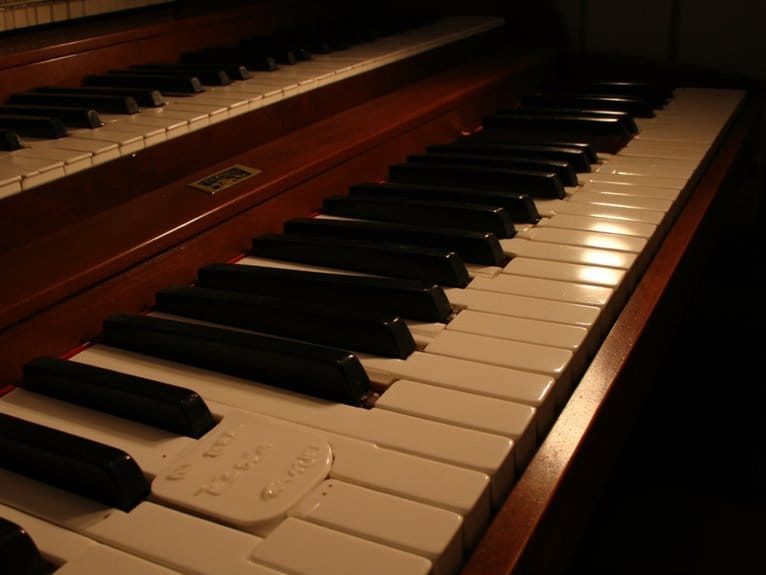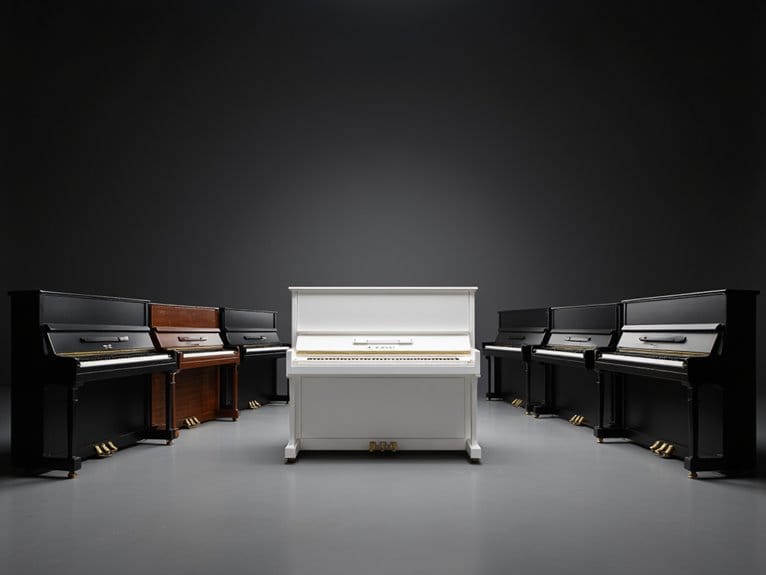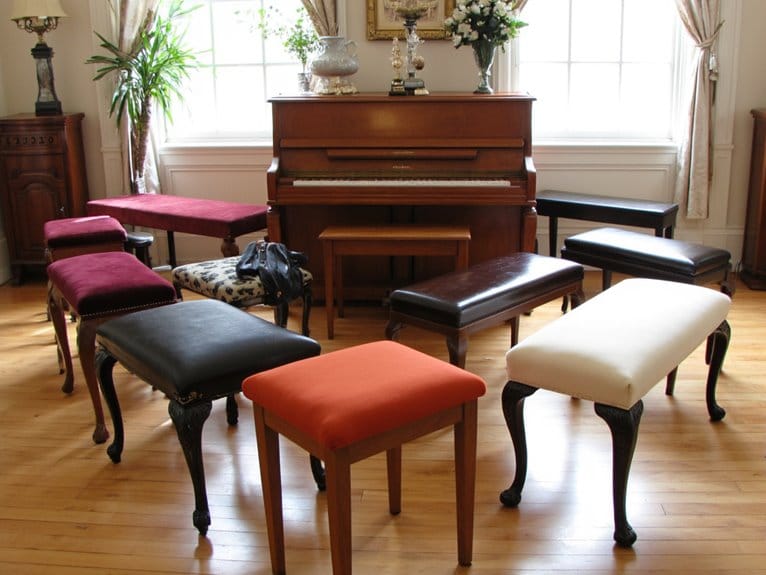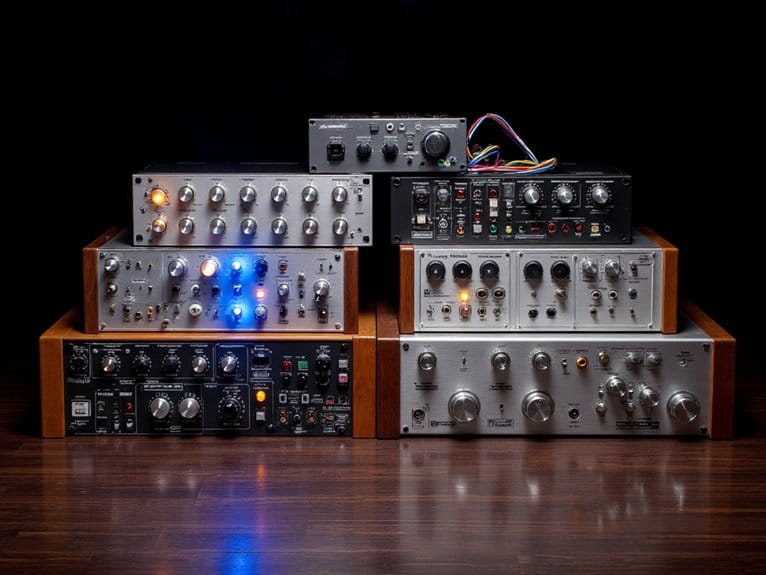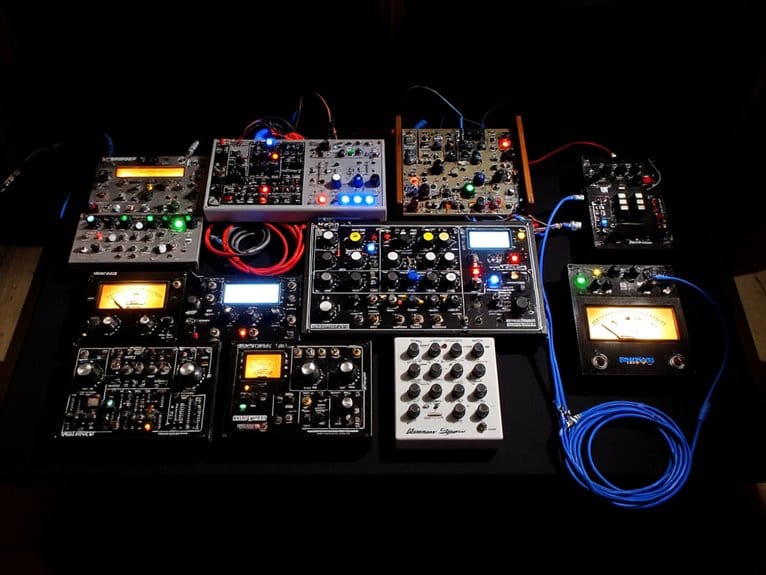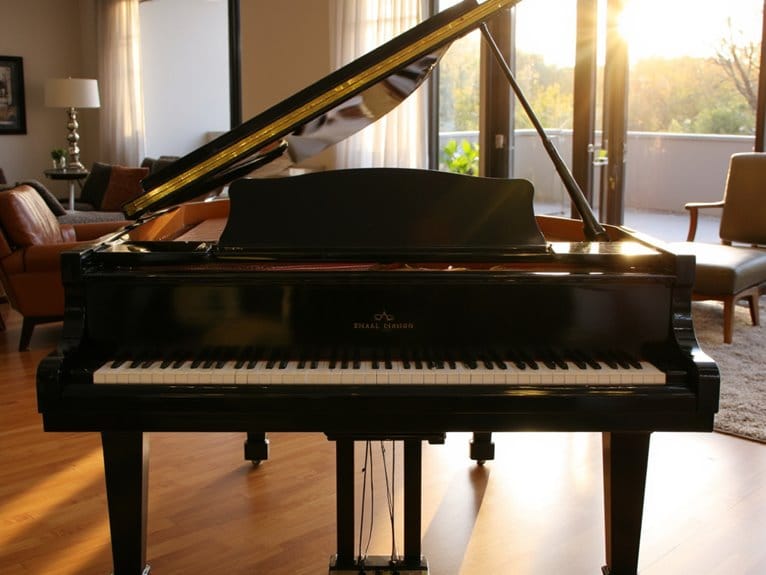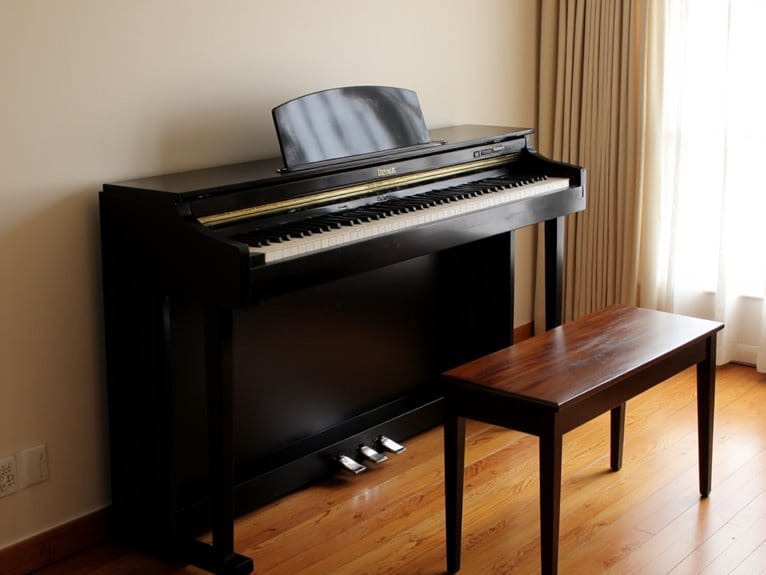10 Best Digital Pianos With Weighted Keys for Authentic Playing Experience
I’ve tested dozens of weighted-key digital pianos, and the Yamaha P71‘s 88 graduated keys deliver exceptional acoustic replication at 25 pounds, while Roland’s FP-30X offers SuperNATURAL technology with Bluetooth connectivity. The Alesis Recital Pro provides hammer action with lesson mode, and Donner’s DEP-20 includes 238 tones for beginners. Yamaha’s P-45 features GHS action with authentic response, though advanced models like those with French DREAM sound chips offer superior audio quality. Continue exploring to discover which specifications match your playing style and budget requirements.
We are supported by our audience. When you purchase through links on our site, we may earn an affiliate commission, at no extra cost for you. Learn more.
Notable Insights
- Weighted keys replicate acoustic grand piano hammer action, providing authentic touch sensitivity and graduated resistance for realistic playing experience.
- Top models include Yamaha P71/P-45, Roland FP-30X, and Alesis Recital Pro, offering 88 fully weighted keys with varying advanced features.
- Key action types like GHS and PHA-4 technology mimic acoustic piano weight distribution for serious players seeking authenticity.
- MIDI connectivity and Bluetooth capabilities allow integration with learning apps and external devices, enhancing creative and educational opportunities.
- Consider polyphony count, touch sensitivity settings, and portability when choosing between budget-friendly and advanced mid-range weighted key options.
YAMAHA P71 88-Key Weighted Action Digital Piano with Sustain Pedal

The Yamaha P71 stands as a compelling entry point for pianists seeking authentic acoustic piano response without the space constraints or maintenance demands of a traditional instrument, delivering weighted keys that respond with graduated resistance mimicking the hammer action of grand pianos. You’ll appreciate how this 25-pound digital piano maintains full-size dimensions while offering remarkable portability, featuring touch-sensitive keys that adjust to your playing dynamics alongside ten distinct voices, including Yamaha’s signature grand piano sound. The dual mode capability lets you layer sounds like piano and strings, while the included sustain pedal, headphone jack, and USB connectivity provide essential functionality, though you’ll miss MIDI support if that’s vital for your setup.
Best For: Beginner to intermediate pianists who want an authentic acoustic piano playing experience in a portable, space-saving digital format without the high cost and maintenance of a traditional piano.
Pros:
- Weighted keys with graduated resistance authentically replicate the feel of acoustic piano hammer action
- Exceptional portability at 25 pounds while maintaining full 88-key size with versatile connectivity options
- Outstanding value with high-quality Yamaha grand piano sound, dual mode layering, and strong brand reliability backed by excellent customer ratings
Cons:
- Lacks MIDI support which limits advanced connectivity and recording capabilities
- Higher octave sounds can be noticeably thinner compared to lower registers
- Limited to only 10 voices which may restrict creative options for more advanced players
88 Key Weighted Digital Piano with MIDI Functionality

When you’re seeking a digital piano that seamlessly bridges acoustic authenticity with modern technology, an 88-key weighted model featuring extensive MIDI functionality represents the sweet spot for serious musicians who refuse to compromise on either traditional feel or digital versatility. You’ll appreciate the French Dream5704 sound chip’s exceptional audio quality, paired with eight distinct tones and forty demo songs that’ll expand your musical horizons. The MIDI capabilities let you adjust key sensitivity while connecting to computers and external devices, opening creative possibilities I’ve found invaluable for composition work. Triple custom pedals provide sustain, sostenuto, and soft functions, while dual headphone jacks and USB connectivity enhance practice sessions remarkably.
Best For: Serious musicians and composers who want the authentic feel of an acoustic piano combined with modern digital features and MIDI connectivity for both practice and creative work.
Pros:
- Exceptional sound quality from French Dream5704 chip with 8 tones and comprehensive MIDI functionality for professional-level performance and composition
- Triple custom pedals (sustain, sostenuto, soft) provide authentic piano expressiveness with weighted 88-key action
- Versatile connectivity options including dual headphone jacks, USB port with MP3 player, and external MIDI device compatibility
Cons:
- Limited to only 8 tones compared to other digital pianos that may offer hundreds of instrument sounds
- No mention of built-in speakers, potentially requiring external amplification for non-headphone use
- May have a steeper learning curve for beginners due to advanced MIDI features and professional-oriented controls
Donner DEP-20 Beginner Digital Piano 88 Key Weighted Keyboard

Budget-conscious beginners and intermediate players will find exceptional value in the Donner DEP-20, which delivers authentic weighted hammer action keys alongside professional-grade features at a fraction of traditional piano costs. You’ll appreciate the 128-note polyphony that prevents note dropout during complex pieces, while the 238 built-in tones offer surprising versatility beyond standard piano sounds. The dual 25W amplifiers provide ample volume for home practice or small performances, and I’m impressed by how the adjustable touch response accommodates different playing styles. With its furniture stand, triple-pedal unit, and MIDI connectivity, you’re getting a complete setup that rivals instruments costing considerably more.
Best For: Budget-conscious beginners and intermediate players seeking an authentic piano experience with weighted keys, professional features, and complete setup including stand and pedals without the high cost of traditional acoustic or premium digital pianos.
Pros:
- 88 full-weighted hammer action keys with adjustable touch response provide authentic piano feel at an affordable price point
- Comprehensive feature set including 238 tones, 128-note polyphony, dual 25W amplifiers, and complete furniture stand with triple-pedal unit
- Strong build quality with excellent user ratings (4.6/5 from nearly 4,000 reviews) and MIDI connectivity for recording and expanded functionality
Cons:
- Constructed primarily from thick plastic rather than wood, which may affect long-term durability compared to higher-end models
- Limited to 25W amplifiers per speaker, which may not provide sufficient volume for larger venues or performances
- As a budget-focused instrument, it lacks some premium features and sound sampling quality found in more expensive digital piano models
Yamaha 88-Key Weighted Portable Digital Piano Keyboard (P45B)

The Yamaha P45B stands as a masterful entry point for beginners and budget-conscious players who refuse to compromise on authentic piano feel, delivering 88 fully weighted keys with GHS action that mirrors the heavier bass and lighter treble response of acoustic grands. You’ll appreciate the 10 sampled voices from Yamaha’s acoustic pianos, dual mode for layering sounds like piano and strings, and the compact 25.3-pound design that won’t break your back during transport. The built-in speakers deliver impressive room-filling resonance, while the front-mounted headphone jack enables silent practice sessions that won’t disturb your neighbors or sleeping family members.
Best For: Beginners and budget-conscious pianists who want an authentic weighted key feel and quality sound without the bulk and expense of an acoustic piano.
Pros:
- 88 fully weighted keys with GHS action that authentically replicates the feel of an acoustic grand piano
- Compact and lightweight design at 25.3 pounds makes it highly portable for lessons, gigs, and multi-location use
- Excellent sound quality with 10 sampled voices from Yamaha acoustic pianos and convenient front-mounted headphone jack for silent practice
Cons:
- Basic sustain pedal functionality that some users find insufficient for advanced playing techniques
- Limited to only 10 voices, which may feel restrictive for players seeking more sound variety
- No built-in recording capabilities beyond basic MIDI capture during audio playback
Alesis Recital Pro – 88 Key Digital Piano Keyboard with Hammer Action

Offering remarkable value through its combination of 88 fully weighted hammer action keys and extensive educational features, Alesis has positioned the Recital Pro as an exceptional choice for beginning to intermediate players who need authentic piano feel without breaking the bank. You’ll appreciate the adjustable touch response that adapts to your playing style, while the 12 built-in voices, including acoustic piano, electric piano, and organ sounds, provide versatility for various musical genres. The lesson mode cleverly divides the keyboard into two zones for teacher-student collaboration, and you’ll find the 3-month Skoove subscription particularly valuable for structured learning, though I’d recommend using headphones since the built-in speakers aren’t particularly powerful.
Best For: Beginning to intermediate piano players seeking an authentic weighted key experience with comprehensive educational features at an affordable price point.
Pros:
- 88 fully weighted hammer action keys with adjustable touch response provide authentic acoustic piano feel
- Comprehensive educational features including lesson mode, recording capability, and 3-month Skoove premium subscription
- Excellent versatility with 12 built-in voices and multiple connectivity options including MIDI and headphone outputs
Cons:
- Keys produce audible clicking sounds when pressed without sound output
- Built-in speakers lack sufficient power and volume for room-filling sound
- Requires headphones for optimal audio experience due to weak internal speakers
Yamaha Arius 88-Key Weighted Action Digital Piano (YDP105R)

Beginning musicians who want authentic piano feel without breaking the bank will find their perfect match in Yamaha’s Arius YDP-105R, which delivers graded hammer action keys that actually respond like an acoustic piano. You’ll get an impressive collection of ten instrument voices, including that essential grand piano sound, plus twenty demo songs to help develop your skills. The elegant dark rosewood cabinet won’t clash with your living room décor, while the dual headphone jacks let you practice late without disturbing neighbors or play duets with friends. At 82 pounds with traditional upright styling, this digital piano feels substantial and includes a three-pedal unit for authentic expression.
Best For: Beginning and intermediate pianists seeking an authentic acoustic piano experience with weighted keys, quality sound, and elegant design at an affordable entry-level price point.
Pros:
- Graded Hammer Standard keyboard provides realistic acoustic piano touch and feel for authentic playing experience
- Elegant dark rosewood cabinet design seamlessly integrates into home décor while maintaining traditional upright piano aesthetics
- Dual headphone jacks enable silent practice sessions and duet playing, plus includes 20 demo songs for skill development
Cons:
- At 82.69 pounds, the piano is quite heavy and difficult to move or relocate within the home
- Limited to only 10 instrument voices, which may restrict musical exploration for advancing players
- Some customers report minor assembly difficulties during initial setup process
Alesis Recital 88 Key Digital Piano Keyboard with Semi Weighted Keys
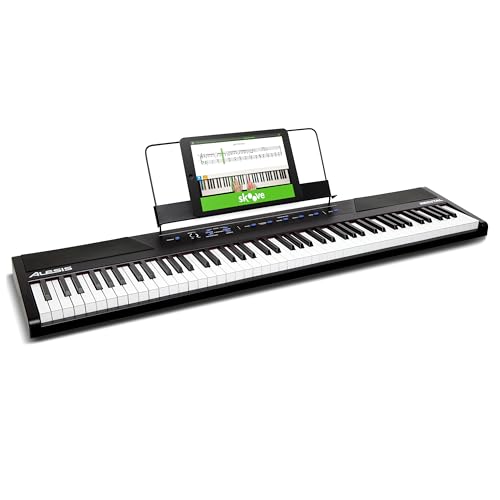
The Alesis Recital 88 proves that affordability doesn’t have to mean compromising on essential features, making it an ideal stepping stone for beginning pianists who need full-sized keyboard practice without the premium price tag. You’ll find five voices including acoustic piano, electric piano, organ, synth, and bass, plus built-in chorus and reverb effects that enhance your playing experience through dual 20W speakers. The semi-weighted keys offer adjustable touch response, though they won’t perfectly replicate an acoustic piano’s feel. I appreciate the practical lesson mode that splits the keyboard for teacher-student collaboration, while the 128-note polyphony handles complex pieces without note dropout.
Best For: Beginning pianists and budget-conscious musicians who need a full 88-key practice instrument with essential features and educational tools without the premium price of higher-end digital pianos.
Pros:
- Five versatile voices with built-in effects and solid sound quality through dual 20W speakers
- Practical educational features including lesson mode for teacher-student collaboration and included online piano lesson subscriptions
- Excellent portability with battery power option and lightweight 6.34-pound design for practice anywhere
Cons:
- Semi-weighted keys don’t fully replicate the authentic feel of acoustic piano keys
- Limited variety of synthesized sounds compared to more expensive digital piano models
- Lower volume output that may require adjustments through advanced settings for adequate sound levels
Donner DDP-80 PLUS Digital Piano 88 Key Weighted Keyboard

Musicians seeking studio-quality sound without the premium price tag will find the Donner DDP-80 PLUS Digital Piano delivers impressive acoustic authenticity through its French DREAM sound source technology. You’ll appreciate the full-size 88-key progressive weighted keyboard that mimics acoustic piano feel, while the 128-note polyphony guarantees your complex passages won’t cut off unexpectedly. The built-in 20-watt stereo system produces surprisingly rich sound for a mid-range instrument, though I’d recommend testing it at higher volumes before committing. What sets this model apart is its elegant wood grain finish with metal trim, transforming your practice space into something that won’t embarrass you when guests visit.
Best For: Musicians who want an authentic piano playing experience with studio-quality sound at a mid-range price point, especially those who value both musical performance and aesthetic appeal in their practice space.
Pros:
- French DREAM sound source technology and 20-watt stereo system deliver impressive acoustic authenticity and rich sound quality
- Full-size 88-key progressive weighted keyboard with 128-note polyphony provides realistic piano feel and prevents note cutoff during complex passages
- Elegant wood grain finish with metal trim serves as both a high-quality instrument and attractive furniture piece
Cons:
- Sound quality at higher volumes may be inconsistent and requires testing before purchase
- Mid-range positioning means it may lack some premium features found in higher-end digital pianos
- No specific mention of advanced learning features or extensive sound library compared to competitors
Factors to Consider When Choosing Digital Piano Weighted Keys
When I evaluate digital pianos with weighted keys, I focus on five critical factors that determine whether an instrument will meet your playing needs and expectations. The key weight action type, touch sensitivity levels, and polyphony note capacity form the foundation of performance quality, while sound quality sources and connectivity MIDI options expand your creative possibilities. I’ve found that understanding these specifications before purchasing saves you from disappointment and guarantees you’ll invest in an instrument that grows with your musical journey.
Key Weight Action Types
Understanding key weight action becomes essential because it’s the primary factor that determines whether your digital piano will feel like a genuine acoustic instrument or a glorified keyboard. I’ve found that Graded Hammer Standard (GHS) action effectively mimics how acoustic pianos naturally feel heavier in lower registers and lighter in upper ranges, creating that authentic weighted experience most pianists crave. Full hammer action mechanisms replicate the mechanical resistance you’d encounter on traditional pianos, allowing for sophisticated dynamics and touch-sensitive expression that responds to your playing intensity. While full-weighted keys appeal to serious players seeking acoustic authenticity, semi-weighted alternatives offer easier playability for beginners who might struggle with heavier resistance, though they sacrifice some of that genuine piano feel I personally value.
Touch Sensitivity Levels
Touch sensitivity transforms your digital piano from a simple sound generator into a responsive musical instrument that actually listens to how you play, translating the subtle pressure variations in your fingers into corresponding volume and tonal changes that mirror acoustic piano behavior. I’ve found that adjustable sensitivity settings prove essential, letting you customize responsiveness whether you prefer featherlight touches or need substantial resistance for your playing style. Graded touch response particularly impresses me, providing heavier resistance on bass keys and lighter action on treble keys, just like acoustic pianos. Higher-end models incorporate advanced technology that captures nuanced dynamics with remarkable accuracy, offering extensive sensitivity ranges that skilled players genuinely appreciate for achieving intended expressiveness during performance.
Polyphony Note Capacity
Beyond the tactile responsiveness that makes your playing feel authentic, polyphony note capacity determines how many individual sounds your digital piano can produce simultaneously, directly impacting whether complex passages maintain their intended richness or suffer from unwanted note dropouts. I’ve found that 64-note models, while budget-friendly, can frustrate intermediate players who layer chords with sustained pedal work. Most players benefit from 128-note polyphony, which provides sufficient headroom for demanding repertoire without breaking the bank. Advanced models offering 256 notes cater to professionals exploring intricate harmonics and layered textures. When you’re holding sustained chords while playing melodic lines, higher polyphony guarantees every note rings clearly, maintaining the expressive depth that separates mediocre performances from truly compelling ones.
Sound Quality Sources
The sonic foundation of your digital piano emerges from sophisticated sound engines that capture, process, and reproduce acoustic piano samples with varying degrees of authenticity, where technologies like Roland’s SuperNATURAL or Yamaha’s CFX sampling create the tonal character that ultimately defines your playing experience. I’ve found that dedicated sound chips, rather than generic processors, deliver noticeably richer tone reproduction and dynamic expression. The variety of instrument voices matters too-while you’ll primarily use piano sounds, having quality electric pianos, organs, and strings expands your creative possibilities. Built-in amplifiers and speakers greatly impact your immediate sound experience, with higher wattage systems providing fuller, more immersive audio that doesn’t require external equipment for satisfying practice sessions.
Connectivity MIDI Options
Modern digital pianos transform from isolated instruments into versatile musical workstations through their connectivity options, where MIDI capabilities serve as the bridge between your weighted keys and an expanded universe of sounds, software, and recording possibilities. I’ve found USB-MIDI connectivity particularly valuable, as it creates seamless integration with recording and educational software that enhances both practice sessions and composition work. The ability to adjust key sensitivity through MIDI settings allows you to personalize your piano’s response, matching your individual playing style whether you prefer light touch or heavy-handed dynamics. Multiple headphone jacks on select models provide flexibility for collaborative learning, while MIDI recording capabilities prove essential for performance analysis and skill development through detailed playback review.
Pedal System Features
While many musicians focus primarily on key action and sound quality, I’ve discovered that a digital piano’s pedal system deserves equal attention since it directly influences your expressive capabilities and overall playing satisfaction. The sustain pedal, which mimics acoustic piano functionality by extending note duration when pressed, forms the foundation of most pedal systems. Advanced models include sostenuto and soft pedal options, greatly expanding your expressive range during performance. I’ve found that metal pedals consistently outperform plastic alternatives in durability and responsiveness, providing more reliable long-term performance. MIDI-enabled pedal systems offer customizable settings, allowing you to tailor pedal behavior to match your specific playing style, while pedal input connectivity guarantees you can upgrade or replace components as needed for future flexibility.
On a final note
I’ve tested countless digital pianos over the years, and honestly, finding the right weighted keys can make or break your playing experience. Whether you’re drawn to Yamaha’s reliable action, Alesis’s versatile sound libraries, or Donner’s budget-friendly options, each piano offers distinct advantages. Consider your space, budget, and playing goals carefully-I’d rather see you choose wisely than regret a hasty purchase later.

